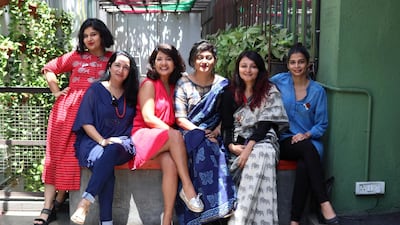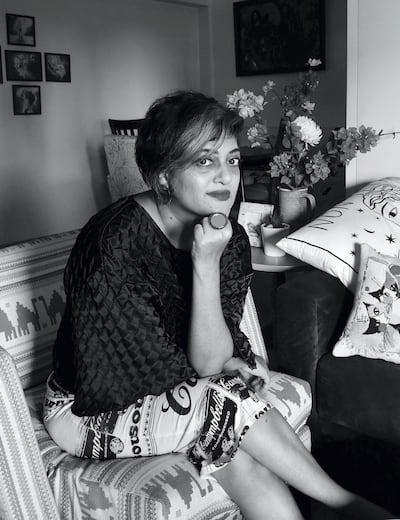Fantasy fiction – especially the dark, sinister kind – is having a moment. Perhaps it's a moment that's been a long time coming, ever since HBO plucked George R R Martin's many morally ambiguous characters from the Seven Kingdoms from the pages of his books and inserted them into the cultural lexicon of our times via the TV screen. Whatever the reason, there's no escaping fantasy fiction.
It's on Netflix, with shows like Stranger Things, Chilling Adventures of Sabrina, and Black Mirror; in movie theatres with Captain Marvel, Avengers Endgame, Shazam, X-Men: Dark Phoenix, and, blessedly, even our literature, with books like Storm Of Locusts, Black Leopard Red Wolf, The Kingdom Of Copper and The Winter Of The Witch.
As captivating as the fantasy fiction genre inherently is, within literature, it's enjoying an unexpected and refreshing awakening. Increasingly, authors are turning to indigenous cultures across the world for inspiration. Rebecca Roanhorse's Storm Of Locusts digs deep into Navajo philosophy and traditions, while Black Leopard Red Wolf, by Marlon James, leans heavily into African folklore. S A Chakraborty's The Kingdom Of Copper paints an invigorating portrait of Middle Eastern culture as its protagonist embraces her heritage, and Winter Of The Witch, by Katherine Ardern, gives us a taste of life in medieval Russia.
Tapping into a universal rage
It's no wonder then, that Indian authors should make the most of the world's collective cultural fascination with reviving poorly remembered myths, giving contemporary spins to epic fables, and reinterpreting folklore that has survived the ravages of time.
Magical Women, a recently released anthology featuring 14 stories by female fantasy fiction writers in India does all of that, and more. Within its 230 pages, we meet bickering and colluding goddesses, demon huntresses with prickly consciences, Tinder-toting evil twins, lovelorn nautch girls and courtesans, revenge-seeking demonesses, a ravaged and raging earth goddess – the list is long, and often sinister.
The book is a lot darker than its benign name lets on. In most stories, rage fuels the protagonists and their motivations, and spurs them to do the heartbreaking, sometimes terrible things they do.
The course of rage twists and turns through the narratives of Magical Women's many protagonists, binding them together, in much the same way that women's destinies are shared and shaped by patriarchy.
Sexual violence is a recurring theme and physical violations are, more often than not, central to the conflict that the book’s protagonists grapple with.
It was not by design. Sukanya Venkatraghavan, the editor of the book and author of one of the stories, tells me that she did not choose or control the patterns or engineer the synchronicity that the stories seem to follow. “You can’t plan that sort of thing. I don’t think most of the writers even knew who the other writers were until I announced it much later on Twitter,” she says. “I discussed the brief with each writer individually. Once all the stories were in, a distinct theme of rage, love and rebellion started emerging.”
There's something rather frightening to be learnt about a culture's zeitgeist when so many of its literary purveyors seem to be echoing the same alarming sentiments. In many ways, Magical Women is indicative of women's collective rage over the atrocities being committed by men – against them and the planet. "We may believe our anger is private or singular, but in essence we are feeling something universal. We're all in it together," says Venkatraghavan. "Magical Women happened to tap into universal rage. It exists because writers have the privilege of turning their rage into art, that's all."
Telling their own stories
Despite the thematic similarities, each story has a unique, stand-alone identity. The emotion might be shared, but its texture varies from story to story, as if being passed from one writer to another to add, subtract, and recontextualise. Nikita Deshpande's The Girl Who Haunted Death and Shveta Thakrar's Carnival At The Edge Of The Worlds are both reinterpretations of popular Hindu tales, but their treatment couldn't have been more different. Both challenge our assumptions about what makes a story live on, but while Deshpande evocatively reimagines death, Tharkar is preoccupied with the discovery of life, meaning and purpose.
"Myths exist in the gaps between stories and truths," Deshpande says in an attempt to explain why her Savitri, the protagonist of The Girl Who Haunted Death, contradicts every perception of her character as popularised by Hindu mythology.
“We’ve only known Savitri as a devoted wife. The woman who fought death to bring back her husband Satyavan from the dead. That’s her whole identity. I was more interested in exploring her needs and desires as a woman, not just a wife,” says Deshpande.
“What did she think she knew about the world before she was exposed to it? And what does she know now, after hopping back and forth across time and space for hundreds and thousands of years, watching death do its job? To me, Savitri is the embodiment of love, but it’s a love that isn’t confined or controlled by matrimony. This was my attempt to tell the story of the dance between Love and Death – Eros and Thanatos.”
Similarly, Sejal Mehta's Earth And Evolution Walk Into A Bar and Krishna Udyashankar's Apocalyptica both paint bleak pictures of the havoc being wreaked on the planet by climate change, caused by human greed and propensity for violence, destruction and devastation. But while Sejal's bounty goddess Mahi flashes, storms and thunders with fury, Udyashankar's goddesses undertake annihilation with planning and precision. In the end, though, both stories are a warning about how dispensable the human race is, and how easy it would be for the universe to swallow us whole.
“I wanted to show how easy it would be for the earth to do away with us,” says Mehta. “There is this rhetoric that we must ‘save the planet’. The planet does not need saving. We need it. The planet is powerful, far more than we’d ever imagine.”
Both Venkatraghavan's The Rakshasi's Rose Garden and SV Shujatha's Gandaberunda have murderous heroines, but for completely different reasons.
While Venkatraghavan's Ira is alive in her loneliness and uses murder as a weapon to lessen the burden of evil in the world, Sujatha's twins are self-serving and pleasure-seeking, driven entirely by an unbridled greed for material wealth and comforts. And they're entirely at home in the 21st century.
"I was keen on setting the story in the modern day. I thought it would be most frightening if the monster was just like us – relatable and familiar," says Sujatha. "Gandaberunda is a reflection of the evil we are all capable of, if our moral compasses were broken." I have to admit, there is something morbidly fascinating and liberating about admitting that nobility is a construct, an illusion we submit ourselves to so we can check our worst impulses.
A new twist on Hinduism
As in every anthology, some stories speak to you more eloquently than others. As someone who was raised Hindu, I've grown up listening to the official, accepted versions of the tales than make up my mythological heritage. It is a heritage that lionises its men, and reserves all the speaking parts for its powerful, great male gods. All my life, I've seen my goddesses from the point of view of the men – the men who were their partners, their chroniclers, and their worshippers, and valued them for the virtues valued by men. So any story that seeks to shatter the mould in which my goddesses have spent an eternity finds a place in my heart.
In Tridevi Turbulence, author Trisha Das addresses internalised sexism, patriarchy, and misogyny through a conversation between Parvati, Lakshmi and Saraswati, the three principal goddesses within Hinduism. Each one is positioned as a metaphor for modern society. "Parvati represents the narrow, restrictive and often violent nature of orthodox thought.
Lakshmi represents modern materialism and the dissatisfaction and disconnection associated with it. And Saraswati represents intellectualism and independent thought,” Das tells me. Though satirical, the conversation is equal parts a scathing indictment of the state of the world.
Magical Women can be many things to its readers. For some, it might be a brief respite from reality, as they thrill in the romantic rendezvous and heartbreaks of otherworldly women; for others, it might be their first introduction to the frustrations and preoccupations of women around the world. For me, it is a collection of stories that celebrates the forgotten, vulnerable, marginalised characters within India's rich cultural inheritance.
AsDeshpande tells me: “By reimagining Savitri’s story, I am choosing to celebrate those parts of Hinduism that I believe can redeem and heal us as a community – plurality, multiple gods, multiple narratives. There’s space within these mythical narratives for differing perspectives.
“The fact that these spaces exist tells me that the people who built these stories were thinking about complex things.”


